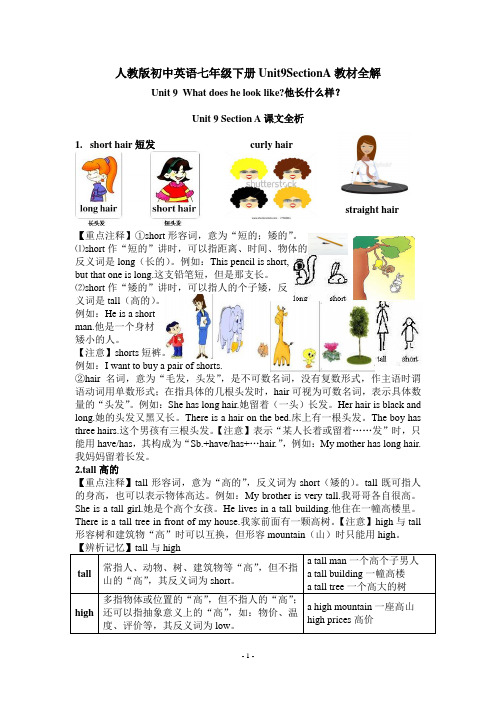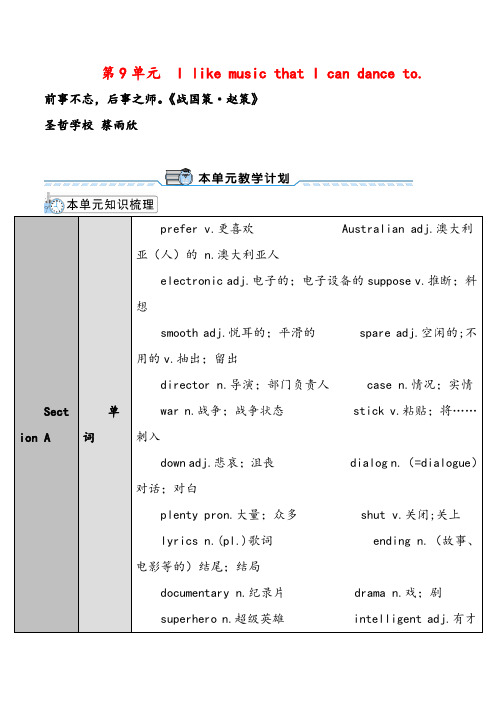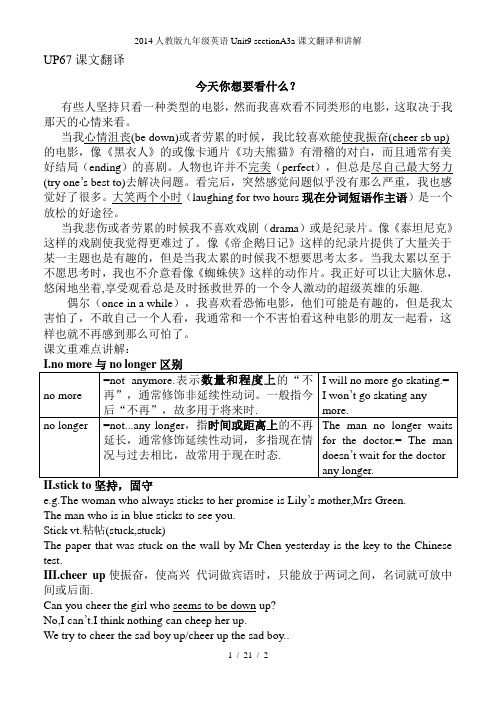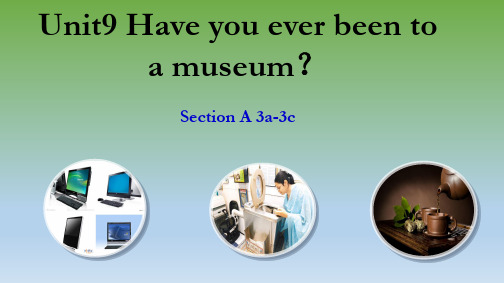Unit9 Section A
人教版初中英语七年级下册Unit9SectionA教材全解

人教版初中英语七年级下册Unit9SectionA教材全解Unit 9 What does he look like?他长什么样?Unit 9 Section A课文全析1.short hair短发curly hairstraight hair【重点注释】①short形容词,意为“短的;矮的”。
⑴short作“短的”讲时,可以指距离、时间、物体的“短”,反义词是long(长的)。
例如:This pencil is short,but that one is long.这支铅笔短,但是那支长。
⑵short作“矮的”讲时,可以指人的个子矮,反义词是tall(高的)。
例如:He is a shortman.他是一个身材矮小的人。
【注意】shorts短裤。
例如:I want to buy a pair of shorts.②hair名词,意为“毛发,头发”,是不可数名词,没有复数形式,作主语时谓语动词用单数形式;在指具体的几根头发时,hair可视为可数名词,表示具体数量的“头发”。
例如:She has long hair.她留着(一头)长发。
Her hair is black and long.她的头发又黑又长。
There is a hair on the bed.床上有一根头发。
The boy has three hairs.这个男孩有三根头发。
【注意】表示“某人长着或留着……发”时,只能用have/has,其构成为“Sb.+have/has+…hair.”,例如:My mother has long hair.我妈妈留着长发。
2.tall高的【重点注释】tall形容词,意为“高的”,反义词为short(矮的)。
tall既可指人的身高,也可以表示物体高达。
例如:My brother is very tall.我哥哥各自很高。
She is a tall girl.她是个高个女孩。
He lives in a tall building.他住在一幢高楼里。
Unit9Haveyoueverbeentoamuseum_SectionA1a-2c课件人教版英语

Free talk Have you ever been to a/an_...? Yes, I have. /No, I haven’t.
have been to (去过),可 以与never[从没], ever [曾经], just[刚刚], once [一次], before[之前]连接。
ahsnmsciapsiawetutaruonscatrrecetmeymemrmzumeopusnuuoeastsuserepeumkuuammrmk
“我也是”结构: So+助动词/情态动词/be+主语(肯定) “So+助动词/be动词/情态动词+主语I.”=Me,too.
Drills --I have ever been to _a_s_c_i_en__ce__m__u_se_u_m___.
Have you ever been there?
回答1:Yes, __I_h_a_v_e___.
➢ 拓展:表示后者与前者情形相同,即“……也不……”时, 常用Me neither.或neither/nor引起的倒装句: Neither/Nor+助动词/系动词be/情态动词+主语.
时态上与前文保持一致,数要与其后的主语一致。
例:—I have never been to a water park.
Look at the map of the town. Listen and circle the places you hear.
2b Listen again and circle T for true or F for false.
Conversation 1
1. Tina went to the space museum last year. T/F
人教版英语九年级下册Unit9_Section A 教案与反思

第9单元 I like music that I can dance to. 前事不忘,后事之师。
《战国策·赵策》圣哲学校蔡雨欣Sect ion A单词prefer v.更喜欢 Australian adj.澳大利亚(人)的 n.澳大利亚人electronic adj.电子的;电子设备的suppose v.推断;料想smooth adj.悦耳的;平滑的 spare adj.空闲的;不用的v.抽出;留出director n.导演;部门负责人 case n.情况;实情war n.战争;战争状态 stick v.粘贴;将……刺入down adj.悲哀;沮丧 dialog n.(=dialogue)对话;对白plenty pron.大量;众多 shut v.关闭;关上lyrics n.(pl.)歌词 ending n.(故事、电影等的)结尾;结局documentary n.纪录片 drama n.戏;剧superhero n.超级英雄 intelligent adj.有才of music. 在他生命后期,他可以演奏600多首曲子。
3. It is a pity that only six pieces of music in totalwere recorded for the future world to hea ,but hispopularity continues to this day. 遗憾的是一共只有六首曲子被录了下来得以传世,但时至今日,他(阿炳)依旧颇受欢迎。
语法定语从句知识目标掌握定语从句的用法。
能力目标能听懂关于个人喜好的对话,并与他人交流此话题;能读懂有关描述个人喜好的文章,并能就自己的喜好进行表达。
情感目标培养高雅的情趣和健康的爱好,学会和他人分享自己的喜好,并学会尊重他人的喜好。
本单元建议5课时Section A(1a~2d)…………………………………………………………………………………………1课时Section A(3a~4c) (1)课时Section B(1a~1d) (1)课时Section B(2a~2e)…………………………………………………………………………………………1课时Section B(3a~Self Check)………………………………………………………………………………1课时词汇短语:主要采用在实际操作中运用的方法。
北师大版高中英语选择性必修3 课后习题 UNIT 9 Section A

UNIT9 HUMANBIOLOGYSectionA TOPICTALK&LESSON1必备知识基础练Ⅰ.单词拼写1.A team from the UK were the first to successfully (克隆) an animal.2.I was also in the desert,where,for the first time,I rode a (骆驼).3.It’s easy to tell a (山羊) from a sheep.4.The police think the videotape may hold some vital (线索) to the identity of the killer.5.Many patients are not getting the medical (治疗) they need.6.You have already made great progress in your (生物).7. (哺乳动物) are animals such as dogs,lions,and whales.8.She had to face the fact that her life had changed (永远).9.It says that better (生殖的) health can reduce poverty and build economic growth.ughter is one of the most infectious expressions of(情感).Ⅱ.单句语法填空1.The (edit) of the magazine is a smart young man.2.Most people look better under (artificially) light than in bright sunlight.3.The (twin) were separated at birth and brought up in entirely different environments.4.It is difficult to make a (compare) with her previous book,because they are completely different.5.While the two are only days apart in age they seem to belong to (whole) different generations.6.You’ve done so much work,so we all believe you’re bound (pass) the eere) because they were getting paid for it.8.Every day the newspapers tell stories of children worldwide who are (abuse).9.I t’s blessing that nobody was in the house at the time.10.We can infer his expression that he is frustrated. Ⅲ.完成句子1.班上每个同学都有能力通过这次考试。
人教版九年级英语unit9 sectiona3a课文翻译和讲解

UP67课文翻译今天你想要看什么?有些人坚持只看一种类型的电影,然而我喜欢看不同类形的电影,这取决于我那天的心情来看。
当我心情沮丧(be down)或者劳累的时候,我比较喜欢能使我振奋(cheer sb up)的电影,像《黑衣人》的或像卡通片《功夫熊猫》有滑稽的对白,而且通常有美好结局(ending)的喜剧。
人物也许并不完美(perfect),但总是尽自己最大努力(try one’s best to)去解决问题。
看完后,突然感觉问题似乎没有那么严重,我也感觉好了很多。
大笑两个小时(laughing for two hours现在分词短语作主语)是一个放松的好途径。
当我悲伤或者劳累的时候我不喜欢戏剧(drama)或是纪录片。
像《泰坦尼克》这样的戏剧使我觉得更难过了。
像《帝企鹅日记》这样的纪录片提供了大量关于某一主题也是有趣的,但是当我太累的时候我不想要思考太多。
当我太累以至于不愿思考时,我也不介意看像《蜘蛛侠》这样的动作片。
我正好可以让大脑休息,悠闲地坐着,享受观看总是及时拯救世界的一个令人激动的超级英雄的乐趣.偶尔(once in a while),我喜欢看恐怖电影,他们可能是有趣的,但是我太害怕了,不敢自己一个人看,我通常和一个不害怕看这种电影的朋友一起看,这样也就不再感到那么可怕了。
课文重难点讲解:e.g.The woman who always sticks to her promise is Lily’s mother,Mrs Green.The man who is in blue sticks to see you.Stick vt.粘帖(stuck,stuck)The paper that was stuck on the wall by Mr Chen yesterday is the key to the Chinese test.III.cheer up使振奋,使高兴代词做宾语时,只能放于两词之间,名词就可放中间或后面.Can you cheer the girl who seems to be down up?No,I can’t.I think nothing can cheep her up.We try to cheer the sad boy up/cheer up the sad boy..IV.make sb do sth.让/使某人做某事The boss makes his workers work all night without overtime pay.The cruel stepmother made the poor girl wash plenty of clothes by the river in winter. The student makes me help with English.Make + sth/sb+形容词使某人(物)....The boy makes me bored.Please make the door open.V.plenty of 大量,充足,许多后接名词复数或不可数名词.Experts have plenty of suggestions.专家们提供大量建议There is plenty of fresh air in the forest.The policeman asked the criminal plenty of questions.VI.shut off“关闭;停止运转”代词做宾语时,只能放于两词之间.名词就可放中间或后面.Please shut off the computer which has something wrong.Shut it up,please.VII.try one’s best to do sth.尽某人最大努力去做某事You should try your best to improve your English.VIII.once in a while=sometimes=at times,副词,偶尔地,间或.在句中做状语.放于句首或句末.Everybody may make mistakes once in a while.Once in a while,I go fishing with my brother.。
八下英语Unit9_SectionA_(3a-3c)

Different kinds of toilets.
2.What does the museum teach people?
The museum teaches people the history and development of toilet. 3I.tW’shaavtedroyeus nthuesumaul mseusmeuemnc./ʌo/urage the government and social gmroaukpes(tsoomdoe?thing) better uncommon quiet It makes them think about ways to improve toilets in the future.
Unit9 Have you ever been to a museum?
Section A 3a-3c
We know the development of computer is
__r_a_p_i_d__(/'ræpɪd/).
in 1963 in 1945
in 1982
in 2010
It’s unbelievable.
different computers
Feeling: u_n_b__e_li_e_v_a__ble
the International Museum of Toilets
: different _t_o_i_le_t_s_
Feeling:
couldn’t _b_e_l_ie__v_e
Development
= become better because__te_c_h_n_o_l_o_g_y_h_a_qs_u_pi_er_to_g_r_es_s_em_d_ai_dn_e_su__ch__aq_r_ua_icp_k_id__w_a_y_ . 3.There was a special computer.
人教八年级上学期英语课件:unit 9 Section A
Can Nick and Peter go hiking tomorrow?
No, they are not free. They might have to visit their grandparents.
Grammar Focus
根据课本内容,完成下列句子。
1. 星期六你能来我的聚会吗? _C_a_n_ you _co_m__e_ to my party on Saturday?
(3) Would you like to come to my party?
How to accept an invitation(接受): (4)Sure,I’d love to. (5)Certainly, I’d love/like to. (6)Thanks for asking me. How to decline an invitation(委婉谢绝): (7)I’m sorry,I can’t .I have to… (8)I’d love to,but I have to… (9) Thanks for your invitation.But… (10)Thank you for asking.But…
5. 当然可以,听起来很棒。 _S_u_r_e_, that _so_u__n_d_s_ _g_re_a_t_.
6. 恐怕不行,我得了流感。
I’m _a_f_ra_i_d_ not. I have the _f_lu__. 7. 他能去聚会吗?
_C_a_n_ he _g_o_ to the party? 8. 不能。他得帮助他的父母。
2.Accepting: accept v.接收。可接名词或代词作宾语,但不可接不 定式。 He accepted a present from his friend.他接受了朋友的 礼物。 He asked her to marry him and she accepted.他向她求 婚,她同意了。 【辨析】accept, receive accept表示主动而且高兴地接受, receive表示被动地 收到, 但不一定接受。
Unit 9 Section A(2a-2d)七年级英语下册(人教版)
Let’s read Read the conversation in 2d and answer the questions.
1) What are Mike and Tony doing later this evening? They are seeing a movie.
2) When are they meeting? They are meeting at seven.
Peter
is
heavy
身高/体型
has
头发
is后多接形容词,用于描述身高、体格等; has后一般接名词短语,用于描述头发等。
Let’s listen 2b Listen again. Fill in the chart.
David
Sally
Peter
is
heavy
of medium
short
height thin
Let’s watch
Lead In
short straight hair
Design your new
long straight hair
haircuts.
(设计你的新发型)
long curly hair
short curly hair I have … hair, but I want to have …hair.
Let’s read Read the conversation in 2d and answer the questions.
1) What are Mike and Tony doing later this evening? 2) When are they meeting? 3) Who is going with them? 4) Where are they meeting? 5) Why does Tony want to know what David looks like? 6) What does David look like?
人教英语九下Unit9第3课时(SectionA Grammar Focus-4c)
play quiet and slow songs.
love、prefer、like是 表达喜好的三个动词。
What kind of movies do you like?
What kind of musicians does Carmen like?
➢ This is the city in which Tom lives.
3. 先行词为that或those时。
➢ What is that which he bought yesterday?
四、引导定语从句的关系副词 关系副词所代替的先行词是表示时间、地点或原因的 名词,在句中作状语。 ➢ It happened in November when the weather was wet and
that/which 指代music, 指物,作宾语,可省略
What kind of music do I love music that/which I can
you like?
sing along with.
What kind of groups does Xu Fei like?
He prefers groups that/which
likes?
先行词是人 关系代词用 that/who
在从句中作主 语,不能省略
She likes musicians who play different kinds of music.
She likes musicians that play different kinds of music.
定语从句 复合句中,修饰某一名词或代词的从句叫作定语 从句。 被定语从句所修饰的词叫作先行词,定语从句一
新人教八上Unit9第一课时(SectionA1a-2d )
Warming up
Free talk I’m really busy on weekdays. I need to relax on weekends. What can I do to relax?
You can …
New Year’s Day is coming. I’m going to have a New Year’s Party at home. Can you come to my party?
have a fever 发烧
have a cough 咳嗽
1c You are the students in the picture. Student A, invite three students to your party. Students B, C and D, give answers.
another time, hang out 3. Sentence: —Can you come to my party on Saturday afternoon? —Sure, I’d love to./ Sorry, I can’t. I have to prepare for an exam.
using “I have to…”/ “I must…”.
1a Match the phrases with the pictures.
1. prepare for an exam __a__ 2. help my parents __e___ 3. go to the doctor ___d__ 4. meet my friend __b___ 5. have the flu __c___
A: Can you come to my party on Saturday afternoon? B: Sure, I’d love to. C: Sorry, I can’t. I have to prepare for an exam. D: I’m sorry, too. I must go to the doctor.
